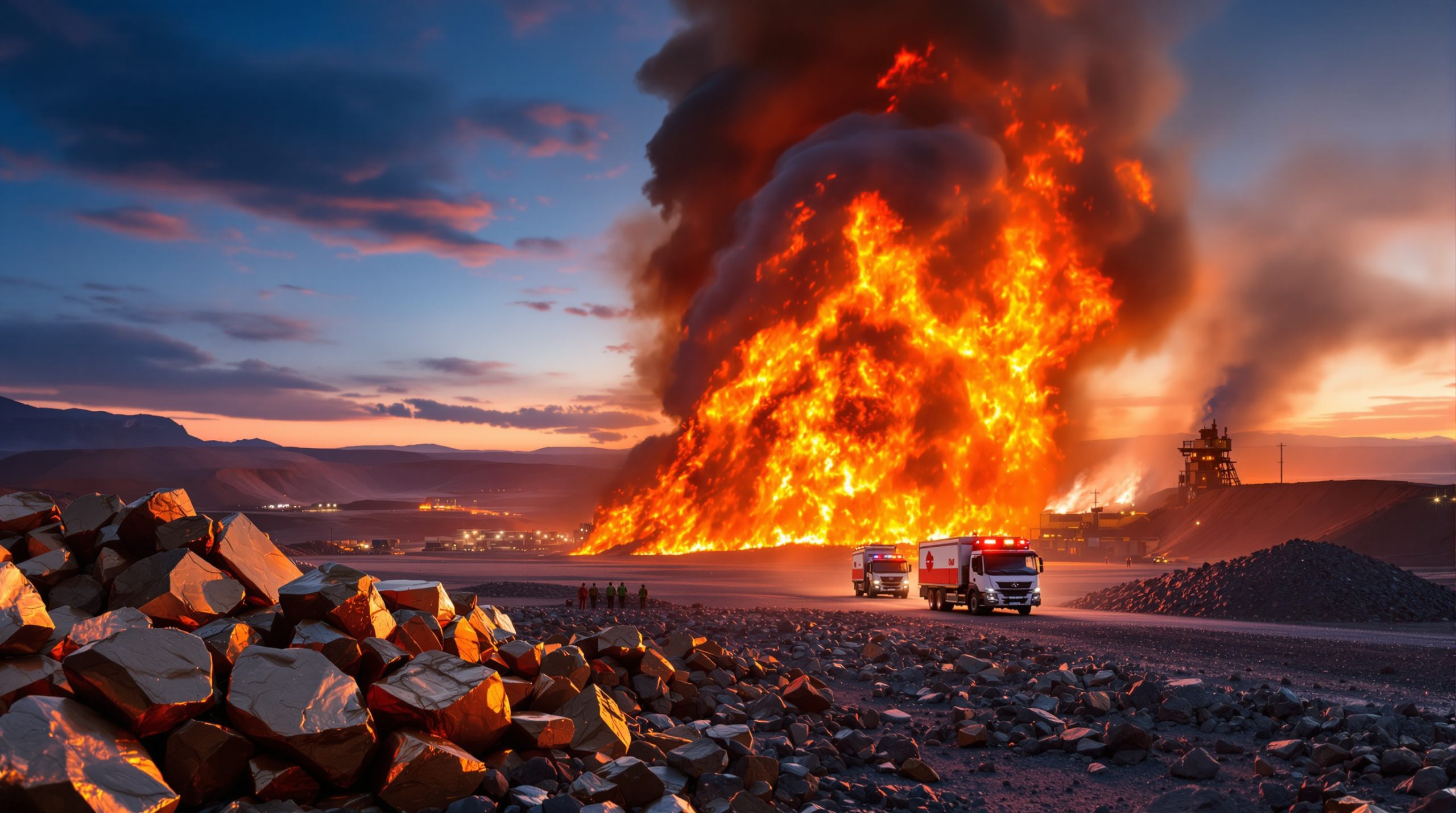Who is Oskar Lewnowski and Why Does He Matter?
In the specialized world of mining finance, few names carry as much weight as Oskar Lewnowski, the founder of Orion Resource Partners and arguably mining's king of private capital and government intervention. As the largest specialist investor in metals and mining focused on private equity and private credit, Lewnowski's perspective on market trends and investment strategies offers invaluable insights into this critical sector.
The Rise of Orion Resource Partners
Founded in 2013 after Lewnowski left the Red Kite hedge fund, Orion Resource Partners has rapidly grown into a powerhouse managing approximately $8 billion in assets. This impressive growth trajectory has established Orion as the largest specialist investor in metals and mining, with a diversified approach that spans private equity, private credit, venture capital, and commodity trading.
Unlike generalist investment firms that occasionally venture into mining, Orion has built a reputation as a dedicated specialist with deep industry knowledge. This specialization has proven crucial in navigating the volatile and technically complex mining sector, where generalist investors often struggle to evaluate risks properly.
What distinguishes Orion's approach is its evolution from traditional mine financing to a comprehensive investment platform. This expansion has enabled the firm to participate in various stages of mining projects, from early exploration to mature production assets, creating multiple avenues for returns in a notoriously cyclical industry.
Lewnowski's Investment Track Record
The numbers speak for themselves: Orion's mine finance funds have delivered average internal returns of 16.1% before fees since inception. Even after fee deductions, mature funds have generated 8-9% returns according to investor reports—impressive figures in an industry known for boom-and-bust cycles.
One standout success in Lewnowski's portfolio involves Chilean copper mines purchased from Anglo American for $300 million in 2015. This strategic acquisition has generated nearly $700 million through selling shares in Capstone Copper, while Orion still maintains a stake worth approximately $470 million—showcasing Lewnowski's talent for identifying undervalued assets with significant growth potential.
What makes these returns particularly noteworthy is that they've been achieved despite the mining sector's notorious volatility and the extensive technical challenges inherent in bringing new mines into production. Lewnowski's approach combines rigorous technical assessment with patient capital deployment, allowing Orion to withstand short-term market fluctuations while focusing on long-term value creation.
Why is a Private Capital Leader Calling for Government Intervention?
The notion of a private equity leader advocating for government involvement might seem counterintuitive, but Lewnowski's perspective comes from witnessing firsthand the systemic failures in mining investment.
The Looming Metals Supply Crisis
Lewnowski warns of a potential crisis comparable to the 1970s oil shocks—a sobering assessment from someone with decades of industry experience. This isn't mere speculation; the International Energy Agency forecasts a need for over $300 billion in copper mine investments alone by 2040 to meet growing demand from renewable energy technologies and electrification.
"When the oil embargoes started happening and prices started to spike in fossil fuels, the US created a strategic petroleum reserve. Something like that will need to happen," Lewnowski notes, drawing a parallel between past energy security measures and current minerals challenges.
The crisis is compounded by China's rare earth export controls and dominance in metal processing, which creates strategic vulnerabilities for Western supply chains. China currently processes more than 50% of global copper, zinc, and aluminum, with even higher percentages for critical energy transition minerals like cobalt, lithium, and rare earths—some exceeding 90% of global processing capacity.
This concentration of processing power gives China significant leverage over global supply chains, creating both economic and national security concerns for Western economies transitioning to cleaner energy systems that require these materials.
The Investment Paradox in Mining
Despite the strategic importance of mining's king of private capital and government intervention having increased dramatically with the energy transition, financing for new mines has paradoxically become more difficult. European banks have largely retreated from the sector due to environmental concerns and perceived reputational risks, while public equity investors have soured on miners after years of volatile returns.
The fundamental disconnect lies in timeframes: developing a major copper mine can take 15-20 years from discovery to production, while public markets demand quarterly results. This mismatch creates an investment vacuum that private capital alone cannot fill, especially given the massive capital requirements for developing modern mines in increasingly challenging geological and regulatory environments.
What Government Interventions Does Lewnowski Recommend?
Based on his extensive experience in the sector, Lewnowski proposes several concrete government interventions to address the looming supply crisis.
Strategic Mineral Stockpiles
Lewnowski advocates for governments to create strategic reserves of critical minerals, similar to the Strategic Petroleum Reserve established after the 1970s oil shocks. This approach would provide a buffer against supply disruptions and price volatility while signaling long-term government commitment to mineral security.
"The government needs to certainly be more involved," Lewnowski emphasizes, pointing to China's active government stockpiling program as a model that Western nations could adapt. China regularly purchases thousands of tons of critical metals for state reserves, creating price stability and supply security for its domestic industries.
Such stockpiles would serve multiple functions: mitigating price spikes during supply disruptions, providing a reliable buyer for domestic production, and ensuring essential materials remain available during geopolitical tensions. This approach has historical precedent in the US post-WWII stockpiling of defense-critical metals—a program that could be modernized for the energy transition era.
Support for Domestic Processing
Perhaps most notably, Lewnowski echoes Trafigura CEO Richard Holtum's call for government ownership of smelting and refining assets. This represents a significant shift in thinking from traditional private capital advocates, recognizing that processing capacity has become a national security issue too critical to be left entirely to market forces.
Western smelters face significant cost disadvantages compared to Chinese operations, which benefit from government subsidies, lower environmental standards, and economies of scale. Without comparable support, Western processing capacity will continue to decline, increasing dependence on Chinese refiners for finished materials regardless of where the original ore is mined.
Government ownership or significant subsidies for domestic processing would maintain critical industrial capabilities, shorten supply chains, and reduce vulnerability to foreign processing bottlenecks. While such intervention represents a departure from free-market principles, Lewnowski argues it's necessary given the strategic importance of these capabilities.
In Australia, CEFC's $75 million investment in the critical minerals sector demonstrates how government bodies are already beginning to address this need.
How Has the Horizonte Minerals Failure Shaped Lewnowski's Perspective?
Orion's challenging experience with Horizonte Minerals provides a case study in the complexities of mining investment and the impacts of Chinese market dominance.
The Brutal Economics of Nickel Mining
Despite being a specialist investor with significant technical expertise, Orion faces substantial losses on its $150 million investment in Horizonte Minerals' nickel project. This failure occurred despite growing nickel demand for electric vehicle batteries—theoretically a perfect alignment of project and market trend.
The project collapsed when construction costs nearly doubled from initial forecasts, a common occurrence in mining but catastrophic for project economics. Simultaneously, massive Chinese investment in Indonesian nickel created an unexpected supply glut that collapsed prices, undermining the project's financial viability despite rising overall demand.
This combination of cost overruns and Chinese-driven price compression demonstrates why even growing demand doesn't guarantee investment success in mining. The technical complexity of extraction combined with opaque global supply development creates significant challenges even for specialized investors.
Lessons from the Horizonte Experience
The Horizonte case illustrates several crucial realities about modern mining investment. First, it demonstrates how demand growth doesn't guarantee investment success when supply responses are concentrated and coordinated, particularly by state-backed Chinese entities.
Second, it shows the vulnerability of Western mining projects, which must deliver competitive returns to private investors, against Chinese competitors with access to low-cost state financing and strategic rather than purely commercial objectives.
This experience has clearly influenced Lewnowski's call for government intervention, highlighting how private capital—even specialist mining investors—cannot compete with state-backed enterprises pursuing strategic rather than solely commercial objectives.
What Price Levels Does Lewnowski Predict for Critical Metals?
As an experienced market participant, Lewnowski offers specific price forecasts that provide insight into the investment requirements for adequate future supply.
Copper Price Forecasts
Lewnowski predicts unprecedented copper prices exceeding $13,000-$14,000 per ton will be necessary to incentivize sufficient mining investment. With current prices around $9,700 per ton, this represents a significant increase needed to stimulate the necessary capital deployment.
This projection isn't merely speculative—it's based on thorough analysis of production costs at increasingly complex and lower-grade deposits that must be developed to meet future demand. As easily accessible high-grade deposits have been largely depleted, new projects require more capital-intensive methods to extract copper from more challenging geological formations.
Without these price increases, supply shortfalls will become inevitable as existing mines deplete and insufficient new capacity comes online. The revised copper price forecast for 2025 suggests even more complicated market dynamics ahead, as analysts struggle to balance multiple competing factors.
Other Metals of Concern
Beyond copper, Lewnowski identifies significant future "challenges" for tin, uranium, lithium, and cobalt—all essential for the energy transition. Each faces unique supply constraints: tin production is concentrated in politically unstable regions, uranium mining was depressed for decades following Fukushima, and lithium and cobalt face processing bottlenecks despite adequate raw material reserves.
The fundamental challenge is that investors cannot deploy capital based on hypothetical future prices—they must make decisions on current economics and observable trends. This creates a timing mismatch between investment needs and market signals that government intervention could help address by providing certainty and stability.
How Does China's Approach Differ from Western Countries?
Understanding China's comprehensive minerals strategy provides context for Lewnowski's calls for Western government intervention.
China's Strategic Minerals Strategy
China stands as the most active government stockpiler of metals globally, regularly purchasing thousands of tons for state reserves. This approach provides price stability for domestic producers while ensuring supply security for Chinese manufacturers.
More significantly, China has invested heavily in processing capacity for critical minerals over decades, creating dominant positions in refining and smelting that far exceed its share of actual mining. This strategic focus on the value-added processing stage gives China significant control over global supply chains regardless of where raw materials originate.
Chinese companies account for a growing share of total global mining investment, with particular focus on energy transition minerals like lithium, cobalt, and rare earths. This investment follows a coordinated strategy that aligns with national industrial policies rather than pursuing purely financial returns.
The Indonesian Nickel Example
The Indonesian nickel industry provides a telling example of China's approach. Chinese producers have "driven up supply to a point where prices have collapsed," putting "a lot of pressure on competitors" like Horizonte Minerals. This market flooding demonstrates China's ability to control markets through strategic investments aimed at long-term dominance rather than short-term profits.
Meanwhile, Indonesia's mining law revision has boosted its domestic industry, creating a more favorable environment for these Chinese investments while capturing more value domestically.
Western governments, having recognized this strategic disadvantage, are now asking private capital leaders like Lewnowski how to "catch up to the Chinese." This represents an important shift in thinking, acknowledging that critical minerals require strategic rather than purely market-based approaches.
What Are the Challenges of Mining Investment?
To understand Lewnowski's perspective, it's essential to appreciate the unique challenges that make mining investment particularly difficult.
The Reality of Mine Development
Building mines has become harder than ever as the best deposits have been exploited, leaving more complex, remote, and lower-grade resources to be developed. This geological reality translates directly into higher capital requirements and longer timeframes for new projects.
Construction costs have spiraled higher due to both inflation and increasing technical complexity. Modern mines must incorporate sophisticated environmental controls, community development programs, and complex processing technologies to handle challenging ores—all of which increase capital intensity.
Permitting processes have become more difficult and time-consuming in most jurisdictions, adding years to development timelines and regulatory uncertainty to project economics. This extended timeline amplifies financing challenges, as few capital sources can commit to the decade-plus horizon required for mine development.
The cyclical and long-term nature of mining investments deters generalist investors who lack the technical expertise to evaluate projects and the patience to weather market volatility. This creates a fundamental mismatch between capital availability and investment requirements.
Private Capital's Unique Role
Specialist funds like Orion fill the gap left by retreating banks and public markets, providing both expertise and patient capital tailored to mining's unique characteristics. This role requires what Lewnowski describes as "boosterish optimism with gallows humor born of regular disappointment"—a recognition of mining's inherent challenges.
The ability to withstand market volatility is essential: specialist investors "don't panic" even in tough times, maintaining a long-term perspective that aligns with mining's development timelines. This contrasts with public markets' short-term focus and explains why specialized private capital has become increasingly dominant in mining finance.
Increasingly, sovereign wealth funds are partnering with mining-focused private capital managers, combining patient capital with technical expertise. This trend suggests a growing recognition of mining's strategic importance and the need for dedicated, specialized investment approaches.
The Path Forward: Balancing Public and Private Investment
The future of critical minerals supply will likely require an unprecedented partnership between private capital and government support. Lewnowski's perspective, coming from the heart of private mining finance, lends particular credibility to calls for strategic government intervention.
As the energy transition accelerates, the tensions between mineral demand and supply constraints will only increase. Addressing these challenges will require innovative financing approaches, strategic government planning, and recognition of critical minerals as essential to both economic and national security.
Countries like Australia are already moving in this direction with Australia's $400 million boost to Iluka's rare earth refinery, demonstrating how governments can strategically support critical mineral processing capabilities.
The mining sector stands at a pivotal moment—either it will receive the strategic support and investment needed to meet future demand, or supply constraints will create economic bottlenecks and geopolitical vulnerabilities. Lewnowski's warnings from the frontlines of mining finance deserve serious consideration by policymakers and investors alike, especially as mining's king of private capital and government intervention advocates for a new approach to securing critical minerals.
The role of host governments in managing the mining sector will be crucial to preventing conflicts while ensuring adequate supply chains for the future.
Want to Stay Ahead of Major Mining Discoveries?
Don't miss the next groundbreaking mineral find! Discover real-time ASX mineral discovery alerts powered by the proprietary Discovery IQ model at Discovery Alert, turning complex geological data into actionable investment opportunities before the market catches on.




